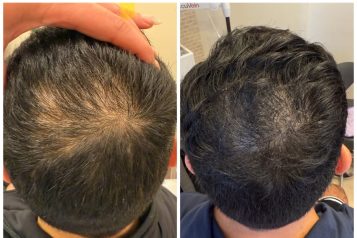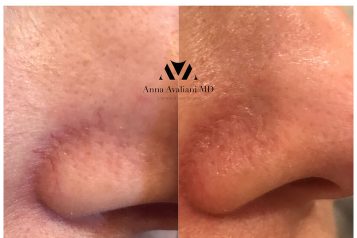 Photo Credit: Shutterstock
Photo Credit: Shutterstock
In the case of cosmetics and any elective surgery, it is vital that doctors are the ones to put a stop to unnecessary procedures, especially for specific reasons. Whether it's body dysmorphic disease (BDD) or unrealistic expectations - the grounds to not operate on a patient are very clear. Haute Beauty experts discuss the reasons why they would NOT operate on a patient. Here is what they had to say:
Dr. Mark Albert | Nose | New York
The most important thing I consider in these situations is whether I can see the issue that the patient is concerned about. If I don’t see what the patient sees, I’m certainly not able to help them. There are also instances where I don’t think surgery will make things better (from an aesthetic and functional perspective) and I occasionally have to explain this to patients and help them understand why that is.
For more information, visit Dr. Albert's website, Instagram, or Facebook!
Dr. Brian K. Machida | Face | Los Angeles
I would not operate on a patient if they are medically unable to undergo surgery. If a patient is on blood thinners and cannot stop or if they have a cardiac condition that is not cleared by their cardiologist, those are good reasons not to proceed.
Sometimes a patient may not be a candidate for surgery. If a patient has a misconception of achievable results, I spend a great deal of time counseling the patient on the goals of the surgery. If the patient still has a misconception of the results, I consider declining to do the surgery and would advise the patient to seek another opinion.
For more information, visit Dr. Machida's website, Instagram, or Facebook!
Dr. Oliver Chang | Brazilian Butt Lift | Miami/Fort Lauderdale
Cosmetic or aesthetic operations are always performed to improve any area of concern the patient has - whether it is a perfect result or a slight change. But, of course, this is discussed at length prior to the procedure along with the risks, steps, and possible outcomes. Throughout our careers as surgeons, we learn through our mistakes (both good and the bad) - and I would have to say one of the biggest mistakes on operating on anybody is - doing a procedure that will not satisfy the patient's desire. In this case, a good pre-operative discussion is needed to help understand both the patient and myself. In the current social media craze world that we live in, 'wish pics' are always an asset to understanding how the patient perceives themselves as well as what they think surgery can do for them. If the desired outcome is something that is within the range of the surgeon's skills and is attainable - that is the best-case scenario. As I wisely age in my career, making sure the patient understands that surgery sometimes is only part of the process in achieving their ultimate goals - this is something I enforce, especially in doing body procedures. Good communication and understanding prior to any procedure lead to the best possible outcome even when results are not 100% as expected.
For more information, visit Dr. Chang's website, Instagram, or Facebook!
Dr. Kiran Gill | Body | Naples
All surgeries, elective or not, come with risks. As plastic surgeons, we sometimes have to make the difficult decision of choosing not to operate on a patient for reasons that may be physical, psychological or both. Physically, patients need to be in good health to be candidates, especially for plastic surgery. Obesity (BMI >30), smoking, and certain serious health conditions like diabetes can complicate anesthesia, compromise heart function, or affect the ability to withstand and recover from surgery. Psychologically, certain red flags may indicate that someone should not have plastic surgery, including unrealistic expectations (seeking “perfection” or to change others’ perceptions), crisis (divorce, death), the belief that surgery will “fix” problems, or body dysmorphic disorder or other psychological issues. My goal for all of my patients is to be better than before—with natural-looking results and personal satisfaction, and the key to success is operating on patients who are good overall surgical candidates.
For more information, visit Dr. Gill's website, Instagram, or Facebook!
Dr. Jhonny Salomon | Face, Nose | Miami/Fort Lauderdale
Every so often there may be a patient that I decide not to perform a procedure on or suggest an alternative treatment plan. There are several reasons why I would not operate on someone such as:
Unrealistic expectations - Patients need to have realistic expectations and need to be on the same page with the surgeon as to the expected results. A patient who has unrealistic expectations will never be happy with their surgical results and is not a good fit for cosmetic surgery.
Health condition – If you have a health condition that may make it unsafe for you to have surgery, you may not be a good candidate for a cosmetic procedure. At the consultation make sure to tell the surgeon about all your health issues so that an adequate evaluation can be performed.
You are doing it for the wrong reason – Deciding to have a cosmetic surgery procedure performed is a very important decision to take. Plastic surgery can have the most positive effect on self-esteem and confidence when done for the right reasons and can have the opposite effect when done for the wrong reasons.
You are not ready yet – If a patient is not at their ideal weight or their BMI is too high, we may postpone surgery until the patient is where they need to be. You need to be at your optimal health in order to undergo surgery.
Body dysmorphic disorder – A patient that suffers from body dysmorphic disorder is typically obsessed with the way they look and worry excessively about small or imagined flaws – they have a disabling preoccupation with perceived defects that consumes their life. These patients are not good candidates for plastic surgery because they are generally dissatisfied with their results, often causing them to desire additional cosmetic procedures. They perceive the surgery to “fix” their body issues, but this is not the case.
For more information, visit Dr. Salomon's website, Instagram, or Facebook!
Dr. Jose Rodríguez-Feliz | Eyelid Surgery & Face | Miami/Fort Lauderdale
There are many reasons I have decided not to operate on a patient. For surgery to be successful there is much more involved than the actual procedure. The expectations have to be right. The chemistry between the surgeon and the patient has to be there. Compliance with the post-op regimen. Any red flags during the consultation and preoperative period that I feel are not aligning with these priorities then I would not operate on the patient. Unfortunately, some of this can come to the surface after the initial consult and that is why is very important to me to have multiple points of contact with the patient prior to the procedure.
For more information, visit Dr. Rodríguez-Feliz's website, Instagram, or Facebook!
Dr. P. Daniel Ward | Face | Salt Lake City UT
There are many reasons that a patient may not be a candidate for surgery. Some of these are medically related whereas others may be due to issues that are less well defined.
For medical issues, if the patient has some sort of medical condition that makes the surgery risky, we obviously will not proceed with the surgery. Some medical issues that are common that may make us not want to proceed with surgery are things like hypertension or diabetes. Smoking, drug use, substance abuse, etc. are other obvious reasons to avoid surgery. These can all affect the experience of the patient in the operating room and can make that procedure unsafe.
Other, non-medical issues that we sometimes see that would make us desire to avoid surgery can include mental health issues or simply a patient who has expectations that are not in line with what we can realistically achieve. Mental health issues can range from something that is serious to something that is less serious but can tremendously affect the patient's satisfaction with the result.
Finally, the most common area is in patients who are healthy medically and mentally, but they may have expectations or other personality traits that may cause difficulties. I, probably like all surgeons, operate because I want to make my patients happy. I want to relieve the problem that is bothering them. Sometimes, however, a patient’s expectations may not be realistic. This issue can arise from both the surgeon as well as the patient. Read more on why Dr. P. Daniel Ward would not operate on a patient here.
For more information, visit Dr. Ward's website, Instagram, or Facebook!
Dr. Jason Bloom | Face | Pennsylvania
There are many reasons that we don’t operate on patients and I frequently turn down surgery if some of these criteria are not met.
There can be medical reasons that patients can’t undergo surgery. Since this is cosmetic, elective surgery, each patient must undergo a medical clearance by their primary care physician to make sure they are medically ready and optimized for the surgery. I have had patients have unstable diabetes or heart issues that have had to even wait a year or longer in order to get these issues taken care of or under control. Many of the facial rejuvenation procedures that I perform are on patients 60 years old and older and they need to be certain that they can undergo these procedures.
Also in the medical category and more pertinent recently, is that I have had patients ready to go for surgery and cleared, but then contract COVID-19 and test positive at their pre-surgical testing that usually takes place about 4 days prior to the OR. These patients were all rescheduled, but I would certainly not operate on those patients at the time.
Probably the number one reason why I don’t operate on a patient would be if the patient does not have realistic expectations or goals for the surgery. These patients may bring in pictures of themselves “face-tuned” or of their favorite celebrities and explain that they want those certain features on their faces. There is always a conversation with the patient about what is achievable, but those patients who expect something out of the realm of possibility get turned down for surgery. As plastic surgeons, we must explain to patients that our hands and expertise are what is doing the surgery and this is not a computer-generated or robotic process. Everyone’s tissue is different, anatomy is different and healing is different.
Some patients see themselves as much worse than they appear to everyone else. If I can’t truly see for myself in the consultant what is bothering them or they are concerned about, I would not operate or perform a procedure on a patient. It is not infrequent that I tell patients that I don’t see what they are talking about and they wouldn’t want me to operate on something “blindly”. I simply say that they are not ready for surgery or I think it is going to be “a long run for a short slide”, meaning that a large surgery is only going to provide a minor benefit.
Another reason that I would not operate on a patient is if I suspect body dysmorphic disease (BDD). This is a psychiatric problem that must be recognized and referred to a psychiatrist before any surgery or procedures. During the initial consultation, I always ask some BDD screening questions to get a sense of their reasons for seeking our plastic surgery like, “Are you worried about how you look?”, “Do you think about your appearance problems a lot and wish you could think about them less?”, or “How has this problem with how you look affected your life?” Many of these patients are already working with therapists or psychiatrists and clearance must certainly be obtained prior to any procedures being done.
Lastly, there is one intangible thing that makes me pass on performing surgery or procedure on a patient. That usually occurs when my office staff, front desk staff, or office manager gets a “bad vibe” or feeling about a patient. These are patients who treat the office staff terribly or act completely different to them when discussing things instead of what they act like with me. Sometimes patients don’t show their true selves to the surgeon, but the office staff can hear or experience things that cause a red flag to go up.
For more information, visit Dr. Bloom's website, Instagram, or Facebook!
























